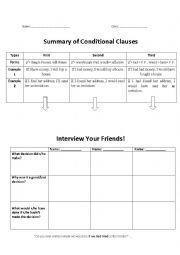
|
1st, 2nd, 3rd Conditional Clauses Summary with an Interview Activity
First make sure students have a good grasp of these three conditional clauses. They take notes on the worksheet (below the arrow) in class. Have students brainstorm more sentences for each category. Later, students walk around the classroom interviewing each other.
Level: elementary
Age: 10-17
Type: worksheet
Downloads: 19
|
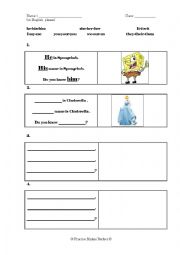
|
A great activity for teaching pronouns (subject/object/possessive pronouns)
1. Have students chant the pronouns with rhythm.
I-my-me
you-your-you
we-our-us
they-their-them
he-his-him
she-her-her
It-its-it
2. Introduce the cartoon characters using pronouns. (see the worksheet)
3. Ask the students to "Draw & Write" about their favorite cartoon char...
Level: elementary
Age: 6-14
Type: worksheet
Downloads: 6
|
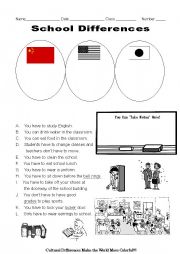
|
Activity for Teaching �have to� and Cultural/School differences
This is an interesting activity -- students get to know what students �have to� do in other countries!
Teacher can first ask students to talk about their country/school and then ask what they think about other countries in the world, i.e. Girls must braid their hair. My students were very curious about these cultural/school differences and they...
Level: elementary
Age: 9-17
Type: worksheet
Downloads: 18
|
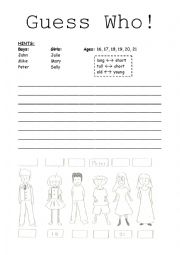
|
Comparative Adjectives- Guess Who Game
Teacher will describe these 6 people using comparative sentences, students have to look at the picture and guess who is being described. I used this in groups, it worked very well, my students loved it! (spice it up by slowing down what you are going to say, students would be so quiet and eager to get the �hints� from the teacher) Enjoy! :)
Level: elementary
Age: 6-100
Type: worksheet
Downloads: 9
|
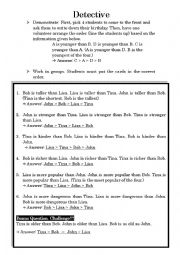
|
Detective Game - Can you find the �wanted� person?
- Great Activity for teaching comparative-superative Adjectives. My students loved it!!!
Level: elementary
Age: 6-100
Type: lesson-plan
Downloads: 56
|
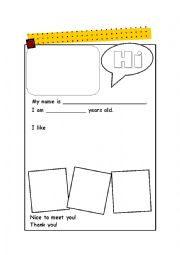
|
Self-Introduction
Have students attach their own photo on the worksheet. If they don�t have one, they can draw their face in the box. For the �I like� section, students can draw their favorite food/animals/sports -- or they can describe what they like using more complicated sentence structures.
"I like dogs" --- for beginner!
v.s.
"During my free time, I like...
Level: elementary
Age: 3-17
Type: worksheet
Downloads: 12
|
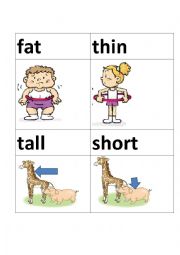
|
Simple Adjective Opposites
a good way to introduce the ideas of adjective opposites. Using clear pictures will help kids� understanding
Level: elementary
Age: 3-16
Type: flash-card
Downloads: 25
|
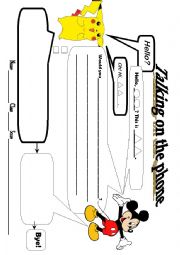
|
Talking on the phone(practice how to make an invitation using �would you�)
create your conversations.
Level: intermediate
Age: 7-17
Type: others
Downloads: 3
|
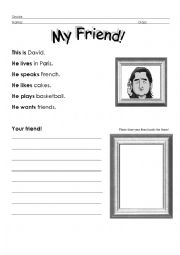
|
Teaching 3rd Person Singular - Introduce my friend
subject-verb agreement
Level: elementary
Age: 6-9
Type: worksheet
Downloads: 26
|
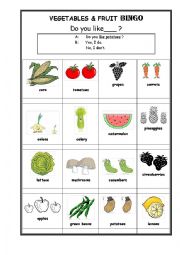
|
Vegetables & Fruit BINGO- Interview your classmates! Do you like~?
Students interview each other on what they like and don�t like and try to achieve bingo. Run through the vocabulary. Then the students have to walk around and ask �Do you like_____________�. The student either answers �Yes, I do� or �No, I don�t�. If yes, then the other student signs the square. They must do this until they get a bingo, or if you ...
Level: elementary
Age: 3-100
Type: worksheet
Downloads: 23
|